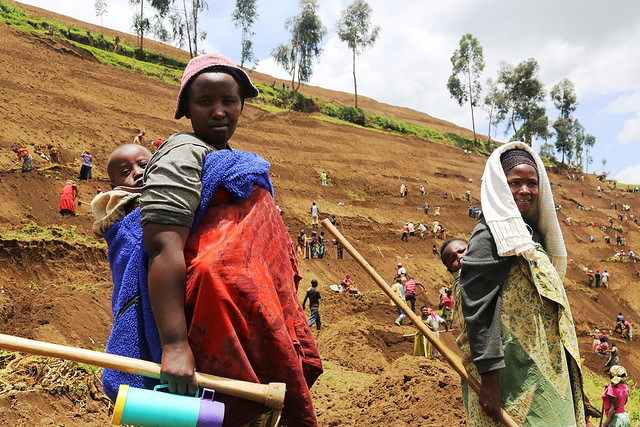Adaptation Fund Webinar to Share Country Experiences in Environmental, Social and Gender Approaches to Projects
Washington, D.C. (April 17, 2018) — As part of its ongoing activities to foster environmental, social and gender principles in Adaptation Fund projects, the Fund will host a climate finance readiness webinar on the theme for its accredited national implementing entities (NIEs) this week.
The April 19 webinar, which is the Fund’s sixth organized by its readiness programme around special themes for its country-level implementing partners in the field, will gather many of the Fund’s 28 NIEs from across the globe to discuss and share experiences on Mainstreaming environmental, social and gender issues in adaptation projects and programmes. The Fund pioneered Direct Access, which empowers developing countries to design and implement projects and access funds directly through NIEs.
Adaptation Fund staff and partners will provide guidance on complying with the Fund’s proactive Environmental and Social Policy adopted in 2013 and follow-on Gender Policy and Action Plan, which collectively foster human rights, gender equality mainstreaming, biodiversity and habitat conservation, as well as vulnerable groups and other principles in projects funded by the Adaptation Fund. NIEs from Africa, Latin America and the Caribbean will discuss approaches they have used to comply with the policies, positive impacts on the ground and advise on how best to identify and mainstream environmental, social and gender considerations into project design and implementation.
“It’s great to see these forward-thinking policies working in action and delivering concrete results to the most vulnerable communities in developing countries,” said Adaptation Fund Board Chair Victor Viñas. “This is another innovative example of the Fund enhancing its tailored, country-led projects by responding directly to countries’ unique adaptation needs.”
Adaptation Fund Board Secretariat Manager Mikko Ollikainen said the Fund’s environmental and social policy has been praised by the UN Special Rapporteur for Human Rights and the Environment as a potential model for similar principles called for in the landmark international Paris Climate Agreement. “These safeguards are really effective in addressing environmental and social risks as well as strengthening the effectiveness of projects, and you see great examples of this from the experiences being shared by the NIEs directly,” Ollikainen said.
The Fund recently hosted a side event on the theme at the COP 23 climate change conference last November in Bonn, Germany, that featured concrete examples provided by implementing partners of the policies being applied in projects in Fiji, Antigua and Barbuda, Argentina, Ecuador and Tanzania. Involving marginalized groups and empowering decision-making among women’s groups in projects, devising practical solutions that incorporate gender considerations and indigenous knowledge, restoring natural ecosystems, and developing projects with an inclusive approach that involves local stakeholders and NGOs to enhance the focus on the most vulnerable, were among the examples discussed.
Further context and examples of the policies being applied were detailed in an article featured in the Fund’s 10th Anniversary publication last year. The Fund has also released practical guidance documents for implementing entities to comply with both the environmental and social, and gender policies. Additionally, the readiness programme offers small technical assistance grants periodically to help NIEs build their capacities to address and manage environmental, social and gender risks.
ABOUT the ADAPTATION FUND
Since 2010, the Adaptation Fund has committed US$ 532 million to support 80 countries, with nearly 5.8 million direct beneficiaries.
Communications: Matthew Pueschel, mpueschel@adaptation-fund.org or +1-202-473-6743
Attachments
| Attachment | Type | Size |
|---|---|---|
| Press release April 17, 2018 | 347 KB |



